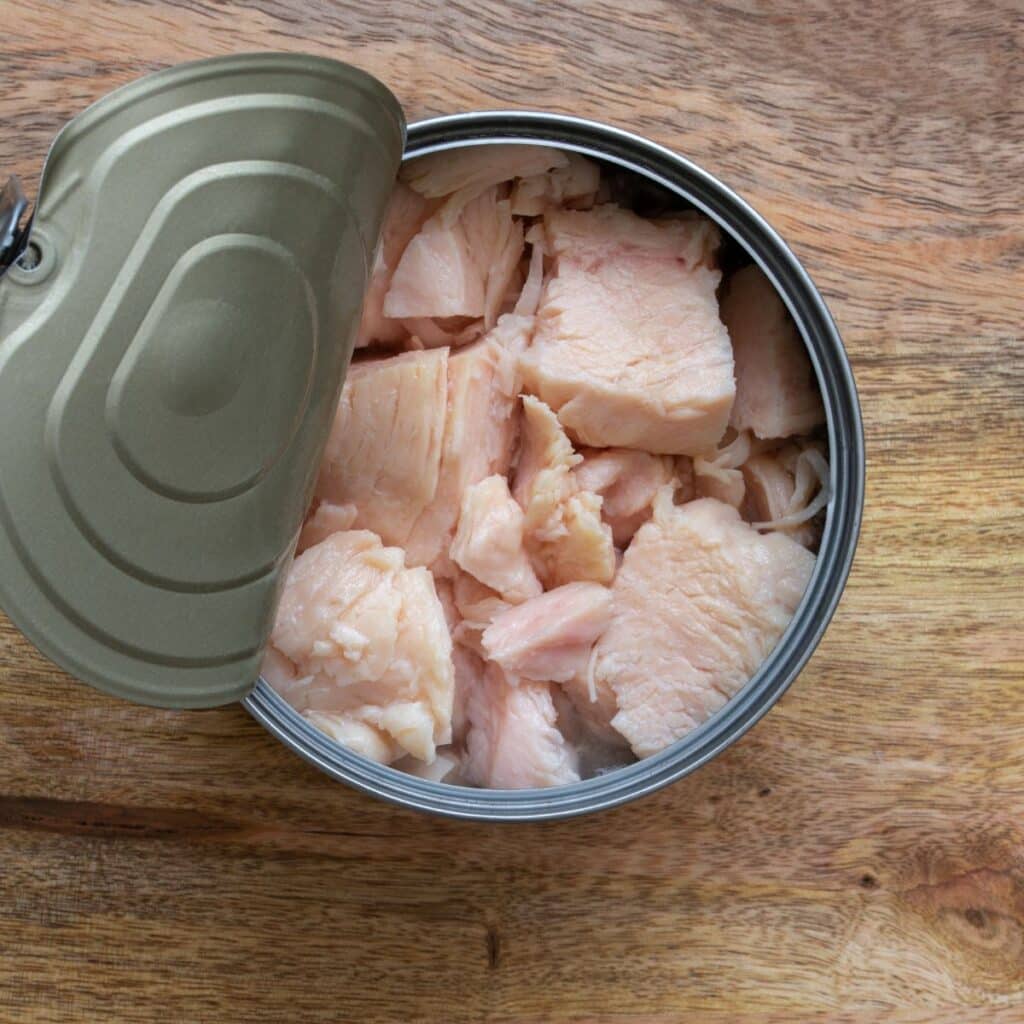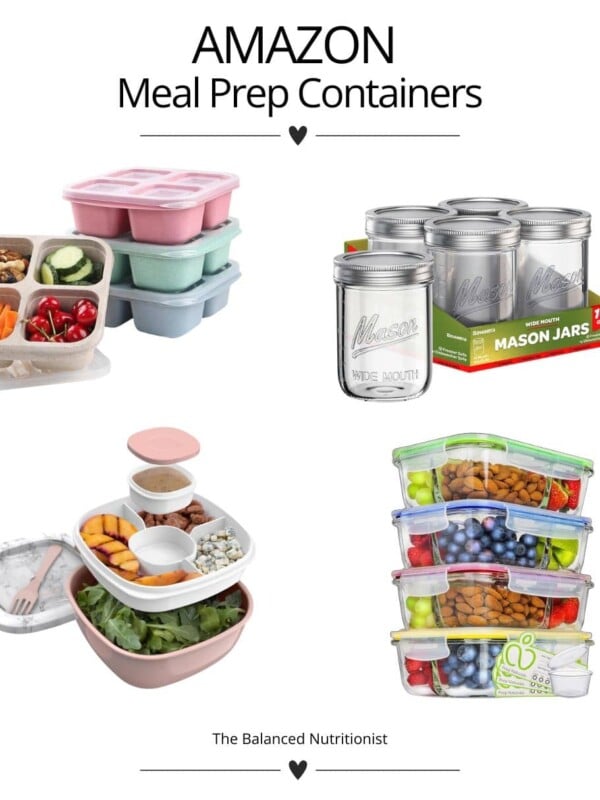This post may contain affiliate links. Please read our disclosure policy.
Canned chicken is a convenient protein source that’s a pantry staple for many households. It’s ready-to-eat, shelf-stable, versatile, and affordable. But you might be wondering: is canned chicken healthy?
In this article, I’ll dive into the details, providing you insight into whether canned chicken deserves a spot in your pantry or you should stick to the fresh stuff.
This post may contain affiliate links.

Canned chicken overview
Canned chicken is simply chicken meat that has been cooked, processed, and sealed in a can to preserve it, just like canned beans, tomatoes, or tuna. Most canned chicken uses chicken breast meat.
Canned chicken is known for its convenience and long shelf life, making it a popular choice for quick meals. There are several types of canned chicken available in the marketplace, including those packed in water, oil, or broth. Each type offers a different flavor and a slight difference in its nutritional profile.
The processing of canned chicken involves cooking the meat before sealing it in a can. This process helps to preserve the chicken, giving it a significantly longer shelf life compared to fresh chicken. Some canned chicken varieties may contain added preservatives to maintain their quality over time as well.
Nutritional Value of Canned Chicken
The nutrition stats on canned chicken depend on whether its packed in water, broth or oil. Most canned chicken on the market is packed in water, so I’ll use that for our comparison here. For this comparison, I’m using Swanson White Premium Chunk Canned Chicken in Water compared with boneless skinless chicken breast.
| Nutrition Facts | White Chunk Chicken Breast in Water (3 oz.) | Chicken breast (3 oz.) |
| Calories | 80 | 134 |
| Total Fat | 1.5g (0g Saturated Fat) | 2.7g (0.8g Saturated Fat) |
| Sodium | 390mg | 40mg |
| Protein | 15g | 26g |
Canned chicken is lower in calories and protein compared with regular chicken breast. The decline in protein is likely not from the processing itself, but due to the mix of light meat and dark meat and addition of liquid.
You’ll also find a few extra ingredients typically in a canned chicken product. For example, this brand’s ingredient list is white chicken breast with rib meat, water, salt, modified food starch, rice starch, and sodium phosphate.
Due to the sodium addition during the canning process, a single serving can contain about 250-400 milligrams of sodium or more, depending on brand and type. Luckily there are low sodium canned chicken brands on the market, so be sure to grab those if you don’t want as much sodium.
High sodium intake can increase the risk of high blood pressure and heart disease, so it’s wise to keep an eye on your overall sodium intake.
Even though it’s lower than fresh chicken breast, canned chicken is a good source of lean protein, which is essential for muscle maintenance and growth. A typical 3 oz. serving size of canned chicken can provide around 15 grams of protein, making it a really nice and convenient option for those looking to increase their protein intake. It’s also still a source of Vitamin B.

Pros of Canned Chicken
High Protein
One of the biggest health benefits of canned chicken is that it’s high protein.
Protein is crucial for maintaining and building muscle mass, which is important for everyone- but especially important for active individuals and those working on weight loss. Protein-rich foods can increase feelings of fullness, helping to control appetite and reduce overall calorie intake.
Protein is also super important if you’re aging because maintaining your muscle mass is extremely important. As we age, meal preparation can get more difficult, so easy options like canned chicken breast can be helpful.
For more info about protein, check out this post: Facts About Protein From a Registered Dietitian.
Convenience
Another huge benefit of canned chicken is its convenience and ability to be eaten right away: it is already cooked and chopped, making it great choice for last-minute meals.
With its long shelf life, canned chicken is a convenient source of high-quality protein for busy lifestyles or emergencies. It requires no refrigeration until opened and can be incorporated into a variety of dishes with minimal preparation time.
The affordability of canned chicken is another plus point. A 12.5 ounce can of chunk chicken in water at my local Walmart is only $2.78.
Shelf-stable
When comparing the shelf stability of canned chicken vs fresh or even frozen chicken, canned chicken wins. Canned chicken can last 2-5 years if stored properly. Its long shelf-life means less food waste, potentially saving you money in the long run.
Cost
A can of chicken likely ranges from about $1 to $5 at your grocery store, depending on the brand and size, so it’s an incredibly budget-friendly option.
Plus it’s important to note that the shelf stability in my opinion makes it even more valuable and cost-effective because shelf stability means you’re less likely to waste it.
Versatility
Just like cooked chicken breast, canned chicken is incredibly versatile and can be easily used for a variety of dishes. I love using it for Buffalo Chicken Salad!
Cons of canned chicken
Sodium
Like most canned foods, canned chicken is a source of sodium. The exact amount of sodium per serving varies by brand, and luckily there are low sodium varieties available. If sodium is a concern for you, make sure you’re checking the label before grabbing a can.
Lower protein
Canned chicken is still a good source of protein, but it’s lower than fresh. If you’re looking for the most protein per ounce, stick with the fresh chicken.
Additives
Many of the canned chicken varieties on the market have additives, like modified food starch, sodium phosphate and others. These are usually to keep the chicken fresh and shelf stable. If you’re not a fan of extra stuff in the ingredients list, grab one that has a simpler ingredient list of just chicken and salt like this one from Wild Planet.

How to use canned chicken
Canned chicken can be used in just about any chicken recipe you’d think of using shredded or chopped chicken. Having an easy-to-use protein source allows you to enjoy a balanced and nutritious diet with less time and effort.
Here are some ideas to help you incorporate canned chicken into your meals:
- Salads: Add canned chicken to your favorite salads for a quick protein boost.
- Wraps and Sandwiches: Use canned chicken as a filling for wraps or sandwiches.
- Soups and Stews: Canned chicken is an excellent addition to soups and stews that call for chicken.
- Other ideas:
Conclusion
Good news- canned chicken can be a healthy and great source of protein. It can be an especially good option for anyone who needs more convenient options or has a tight budget.
While the higher sodium content and additives may be a concern for some, it remains a practical option when fresh alternatives aren’t available. Plus, there are lots of lower sodium options out there!
Don’t love relying on canned goods? You can always make your own chicken at home! Here’s a super easy way to make Air Fryer Shredded Chicken.
If you love learning about the nutritional content of different products and separating fact from fiction, you’ll love these articles too:













